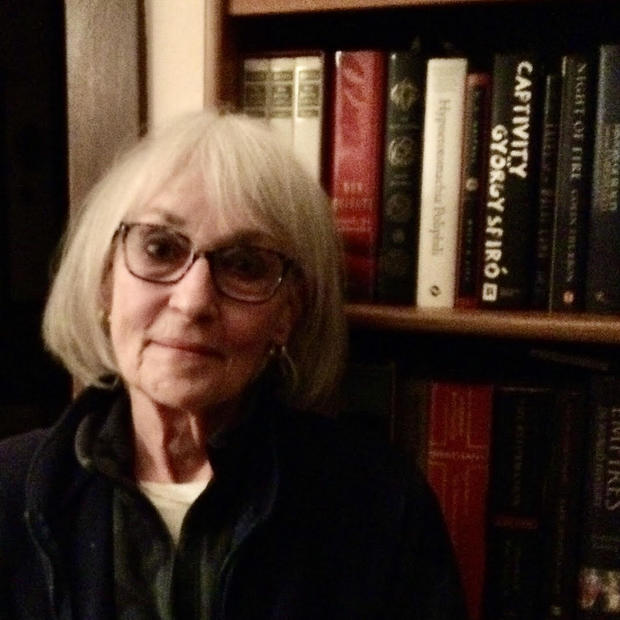Poetry is so badly taught. Teachers present poems as their teachers did before them: trembling at the altar of Profound Life Lessons or pinning pickled specimens to the dissection tray. A poem becomes a thing remote, a veil to be pierced, a mystery that can be revealed only with mental gymnastics and anguish.
Remember those nailbiter poetry quizzes? "Lines 21-22 of Frost's 'Birches' contain an example of (a) personification (b) apostrophe (c) hyperbole (d) irony." Then comes the dreaded essay question addressing theme: "What does the poem mean?" No teacher told you what T. S. Eliot said about "meaning" in poetry: that it's the steak the burglar tosses the watchdog to distract it while he slips into the house to do his work.
Small wonder the typical well-schooled American would much rather down a stiff drink than crack a book of verse.
But opening A. J. Rathbun's In Their Cups: Poems about Drinking Places, Drinks, and Drinkers, the tippler will have company: the speakers in these poems have already tipped a few. Glass in hand they sidle up to you, plunk their elbow beside yours on the bar, and talk.
… And talk! After all, poems are "musical speech," as my favorite English teacher said long ago, quoting Stephen Spender, I believe. A poem is just somebody talking, while also playing with the words until they sing (or sigh, or sizzle) in lines that break when the rhythms of thought and feeling do. It's like a super-short play with a part for just one character. Poems viewed this way don't feel esoteric or alien. They can live in the same neighborhood as all those gasbags spouting monologues on radio and TV.
What Rathbun's collection invites you to do is belly up to the bar of your imagination and say a poem out loud to the imagined imbiber beside you. Go ahead! Raise your glass with Keats and toast the joys of "Sipping beverage divine" at the Mermaid Tavern in the company of bards dead and alive. Sink into nostalgia at "The-Way-We-Were Lounge" and reminisce to the stranger on the next stool about your marvelously misspent youth in Italy.
Or talk to yourself. It's what speakers in poems (like Americans on TV) are doing most of the time anyway. Revel with Appollinaire in the joys of a "Rhenish Night," then turn "pale and sweat" in the morning with hung-over Rimbaud and mutter about having "turned into a bad sign for a bar." Play the role of Emily (a.k.a. Debauchee of Dew) Dickinson and taste a liquor never brew'd. Hiccup like Emily Bedard into the "nearest watering hole" and melodramatically imagine ("Kind sir!") your "honorable life" expiring in "a duel out back in the dusty alley."
In this collection the ancient Li Po also takes a few swigs, along with the venerable Catullus, John Lyly, Robert Herrick, and Cesare Pavese. They and other literary lights mingle companionably with our own Puget Sound poets Bedard, Ed Skoog, Christine Deavel, Allen Braden, Chase Twichell, and Rathbun himself. Blessedly, these talkers, unlike some tiresome drunks and Mary Oliver, all trust your listening ear. They don't yank at your sleeve trying to instruct you in how you should think about what they say.
Rathbun hopes the book is "like a good party," he told me. A poet himself, with a master's in creative writing, he helped run the now-defunct literary magazine "LitRag" with several other Seattle writers for 10 years. So for him one version of a good party is "a bunch of poets getting together at a bar and reading their work."
Rathbun has written several popular books about making drinks. A fascination with mixology that goes back a long way intensified during his 11 years of working in Amazon's kitchen products department, especially after a friend got him interested in old bartending books.Imagining this context for the poets, he decided not to footnote occasional obscurities in the poems. "At a party, in a bar," he said, "sometimes you hear things you don't understand, but you let it roll and have fun. You can always look it up later." He especially likes poetry in free verse, a form that suits the collection's offbeat, sometimes woozy rhythms and tongue-loosened flows of words.
Rathbun has written several popular books about making drinks. A fascination with mixology that goes back a long way intensified during his 11 years of working in Amazon's kitchen products department, especially after a friend got him interested in old bartending books. "We're in the middle of a cocktails revolution now," said Rathbun, "a devotion to craft using old techniques that almost died out."
Besides parties for his friends he likes to throw fancy cocktail fundraising events for a nonprofit his mother is devoted to. "She organizes retreats for people with terminal illnesses. It makes for an interesting tension with good cheer at the fundraisers. I create wonderful punches with fresh juices, we all sing, and Mom talks about death and dying."
Rathbun's collection mixes sad with happy poems as well as old with new. "I like to uncover treasures that people have forgotten," he said, "like really good old drinks, and poems not in the modern lexicon."
A.J. Rathbun reads from In Their Cups: Poems about Drinking Places, Drinks, and Drinkers ($9.95 Harvard Common Press), along with local poets Allen Braden, Emily Bedard, and James Gurley reading from their work, at Open Books: A Poem Emporium, 2414 N. 45th St. in Wallingford, at 3 p.m. Sunday (Sept 26).


